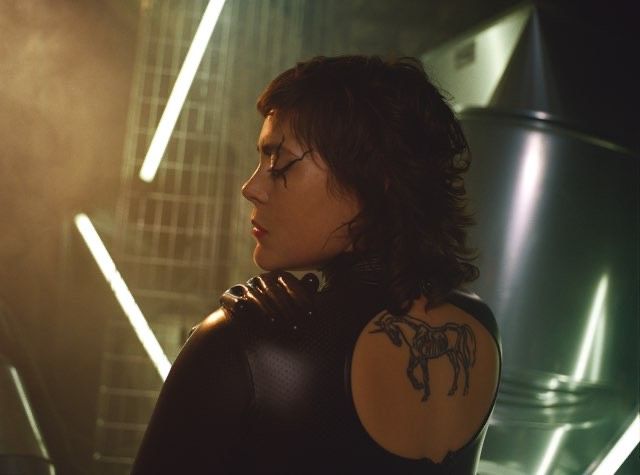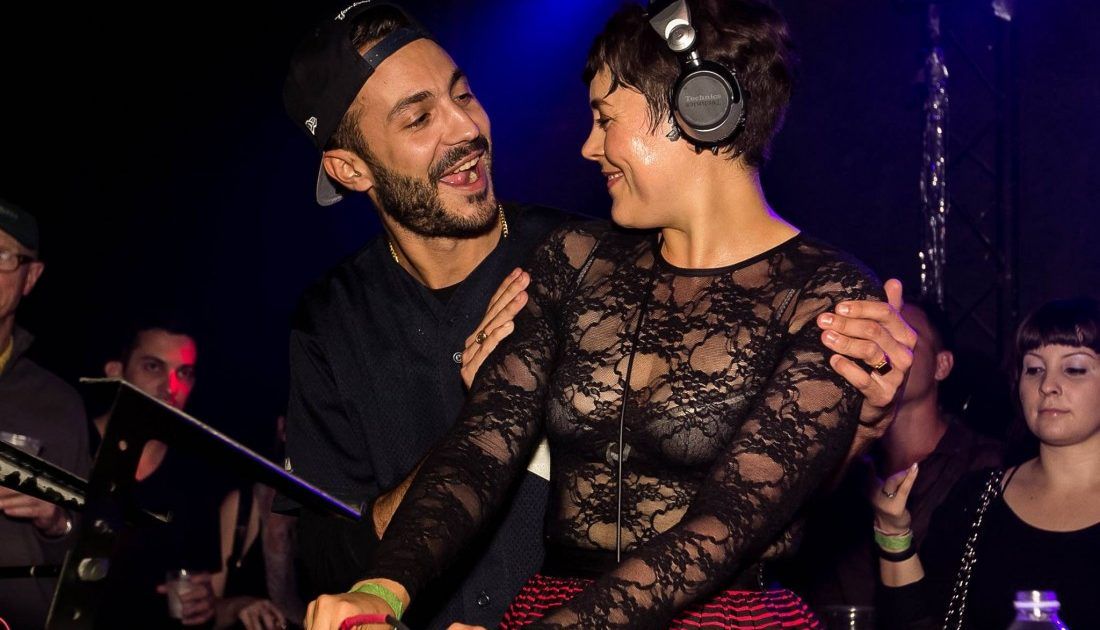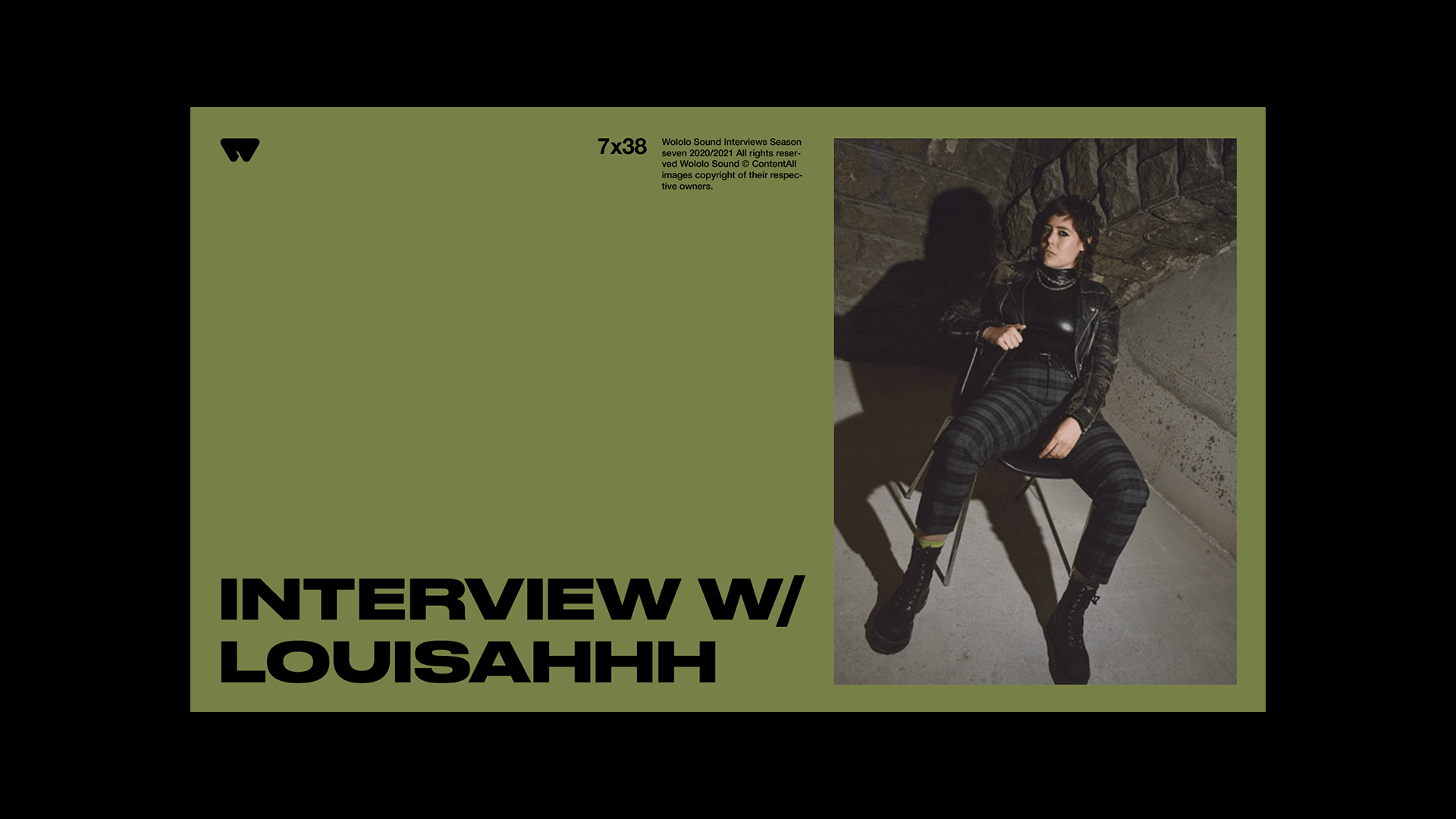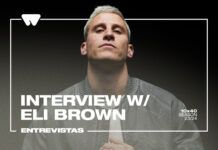Tras el estreno de ‘The Practice of Freedom‘, Louisahhh nos concede esta entrevista en exclusiva
Nacida en Nueva York y asentada en París, hemos charlado con una DJ, productora y vocalista que surfeó la cresta de la ola cuando el electro y el techno se apoderaron del mundo en la primera década de los dosmiles. Una mujer en el mundo de la electrónica que siempre ha tenido las ideas muy claras y que ha aprovechado su inconfundible voz para, dentro y fuera del ámbito musical, predicar sus valores, sus virtudes y su visión del mundo.
La reina punk de la escena techno pasa por nuestros micros para hablar de su cambio de prioridades como artista, la “era Bromance” y cómo la sobriedad y el BDSM le inspiraron a crear su recién estrenado primer álbum ‘The Practice of Freedom‘. Señoras y señores, he aquí nuestra entrevista en exclusiva con la mismísima Louisahhh.

WOLOLO SOUND: ¡Hola Louisa! Antes de nada, es un honor tenerte respondiendo a nuestras preguntas. Hay un montón de cosas pasando ahora mismo, así que empecemos con una pregunta sencilla: ¿cómo te va la vida últimamente?
LOUISAHHH: La vida va bien. Definitivamente ha sido un año intenso para muchos de nosotros de muchas maneras, pero ahí estoy resistiendo. Viviendo el día a día en un sentido muy literal.
WOLOLO SOUND: Hello Louisa! First things first, we are so honored to have you answering our questions. There’s a lot of things happening at the moment, so let’s begin with an easy question: how are you and how is life treating you lately?
LOUISAHHH: Life is good. It’s definitely been an intense year for many of us in all sorts of different ways but I’m hanging in there. Trying to live one day at a time in a very literal sense.
WS: Has estado en activo en el negocio de la música durante décadas, pero este año de momento ha sido para enmarcar. En 2021 presenciamos el lanzamiento de tu primer álbum llamado ‘The Practice of Freedom‘, lo cual es por supuesto un enorme paso para la carrera de cualquier artista. Así que después de todo este tiempo, nos preguntamos: ¿qué te hizo pensar que este era el momento adecuado para hacerlo?
L: He intentado lanzar este álbum durante casi tres años, pero las circunstancias me obligaron a ser paciente y al final estoy orgullosa de que pasara cuando pasó. He aprendido mucho haciendo y lanzando este disco, y aunque a veces la espera hacía que me doliera el alma, no me arrepiento de cómo se ha acabado desarrollando finalmente.
WS: You have been active in the music business for decades, but this year so far has been one for the books. In 2021 we witnessed the release of your debut album called ‘The Practice of Freedom’, which is indeed a huge step for any artist’s career. So after all this time, we are wondering: what made you think that this was the right moment to do it?
L: I’ve been trying to put this album out for almost three years, but circumstances forced patience and ultimately I’m glad it happened when it did. I learned so much from making and releasing this record, and though at times the wait was soul-crushing, I have no regrets about how it unfolded in the end.
WS: El nombre del álbum por si solo es una declaración de intenciones que se refuerza con el tracklist entero, así los que no lo pillaron a la primera, ahora ya lo captan. ¿Cuál es la historia detrás de ‘TPOF‘? ¿Cómo surgió?
L: ‘The Practice of Freedom‘ (“la práctica de la libertad”) es una frase extraída del gran autor y educador, Bell Hooks, que se refiere a la enseñanza para transgredir como “la práctica de la libertad”. Mi propia relación con esa idea está arraigada en mi recuperación de mi adicción con las drogas, siendo la propia sobriedad una práctica liberadora que debe vivirse día a día (al menos para mí). Además, mi propia exploración de lo erótico y mi viaje con la perversión y el BDSM tiene mucho que ver con las ideas de la libertad, y muchas de las canciones van sobre esas cosas.
WS: The name of the album itself is a solid statement that is reinforced by the entire tracklist, so those who didn’t get it at first, now know. What’s the story behind ‘TPOF’? How did it come to life?
L: ‘The Practice of Freedom’ is a phrase borrowed from the great author and educator, Bell Hooks, who refers to teaching to transgress as “the practice of freedom”. My own relationship with that idea is rooted in my recovery from drug addiction, sobriety itself being a liberating practice that must be lived day-to-day (at least for me). Additionally, my own exploration of the erotic and journey within kink and BDSM have a lot to do with ideas of freedom and a lot of songs are about these things.
WS: Hablemos de los aspectos sónicos de ‘The Practice of Freedom‘. Marida un sentimiento y vocales punk con el techno industrial y crudo de una forma natural. Personalmente, me parece preciso describirlo como un álbum punk hecho con herramientas de música electrónica, todo mezclado de una forma muy sólida y coherente. ¿Podrías hablarnos más acerca de las inspiraciones y motivaciones detrás del diseño sonoro de los temas?
L: Mi cercana colaboración con el productor Vice Cooler definitivamente formó el sonido del disco. Él viene de una escuela de pensamiento mucho más punk/autodidacta, y gran parte del diseño sonoro y sentimiento del álbum viene del resultado de nuestras influencias mutuas, como Garbage o Nine Inch Nails, colisionando con mi pasado techno y su parte de genio/bicho raro que ha colaborado con todo el mundo, desde Peaches y Ladytron hasta Chick on Speed y Bikini Kill. Vice es el mejor y estoy muy agradecida por el regalo de haber podido trabajar con alguien tan talentoso, brillante y centrado.
WS: Let’s talk about the sonic aspects of ‘The Practice of Freedom’. It merges a Punk feel and vocals with Industrial and Raw Techno in a natural way. Personally, it feels accurate to describe it as a Punk album made with Electronic music tools, all blended in a very solid and coherent way. Could you please tell us more about the inspirations and motivations behind the sound design of the tracks?
L: My close collaboration with producer Vice Cooler definitely informed the sound of the record. He comes from a much more punk/DIY school of thought, and a lot of the sound design and feel of the album is a result of our mutual influences, like Garbage and Nine Inch Nails, colliding with my techno background and his weirdo-genius that has worked with everyone from Peaches and Ladytron to Chicks on Speed and Bikini Kill. Vice is the best and I’m so grateful for the gift of working with someone so talented, brilliant and focused.
WS: Hemos conocido al lado DJ de Louisahhh durante muchos años, y con este nuevo proyecto estabas a punto de mostrar tu anticipado directo contigo tras el micrófono y algunos amigos tocando música en directo (mención a Maelstrom). Por razones obvias, gran parte del mundo solo pudo degustar este nuevo formato de show que preparasteis a través de los videos en redes sociales. ¿Cómo de diferente es estar detrás de los CDJs o de un micrófono? ¿Qué es lo mejor y lo peor de este nuevo papel que tienes como artista?
L: Como resultado de la preparación de la banda preparándose para ir de gira, la cual será un trío compuesto por mí, Maelstrom manejando las máquinas y el salvajemente talentoso Bertrand James a la batería, pinchar parece muy fácil. Aún me encanta, y es una gozada el estar con público en ese sentido, el establecer un vínculo de energía que se retroalimenta, dando y recibiendo alegremente. Seguiré pinchando mucho si todo va bien, pero es muy emocionante y parece peligroso (y desafiante) el liderar una banda, lo cual ha sido mi sueño desde que era una niña. Valoro la vulnerabilidad y el coraje que se requiere para cantar delante de gente y ponerse uno mismo allí afuera de una forma que parece mucho más cruda y real. No puedo negar que este punto me pone mucho; debo estar preparada, lista para poner toda mi energía en ello, pero estoy muy emocionada para tocar en shows en este contexto. Me encanta tanto la banda, y lo que estamos construyendo juntos me parece muy poderoso, verdaderamente mágico y salvaje.
¿Los inconvenientes? Desafortunadamente, la cantidad de trabajo frente la cantidad de dinero que uno puede hacer como banda es ridícula. Pinchando, te presentas en con tus auriculares y un USB y ya está todo controlado. Por la misma cantidad de dinero, dividido entre cinco personas, tenemos que pillar el local, encontrar nuestro propio sitio donde alojarnos, montar todo, tocar a tope durante una hora, desmontarlo todo e ir al siguiente lugar. Las cifras son ridículas si las comparas, pero es como una aventura y eso es lo que siempre he querido.
WS: We’ve known the DJ side of Louisahhh for many years, and with this new project you were about to showcase your highly anticipated live show with you behind the microphone and some friends playing live music (shout out to Maelstrom). For obvious reasons, most of the world could just have a taste of this new show format you were preparing through videos on social media. How different does it feel to be behind the CDJs or a microphone? What is the best and the worst of this new role you are now playing as a performer?
L: As a result of the preparation for touring the band, which will be a trio with myself, Maelstrom manning machines, and the wildly talented Bertrand James on drums, DJing feels really easy. I still love it, and it’s a joy to be with a crowd in that way, to set up a feedback loop of energy and pass it back and forth joyfully. I will still be DJing a lot hopefully, but it’s really exciting and feels very dangerous (and challenging) to be fronting a band, which has been the dream of my heart since I was a little kid. I appreciate the vulnerability and courage required to sing in front of people and to put oneself out there in a way that feels much more raw and real. I can’t afford to be anything but really ‘ON’ at this point; I must be prepared, ready to put all of my energy on the line, but I’m so excited to get to play shows in this context. I love the band so much and what we’re building together feels really powerful, really magical, and ferocious.
The drawbacks? Unfortunately, the amount of work versus the amount of money one can make as a band is ridiculous. DJing, you show up with headphones and a USB stick, and everything is taken care of. For the same amount of money, divided by five people, we have to get to the venue, find our own place to stay, set everything up, play our asses off for an hour, tear everything down, and go to the next place. The economics are ridiculous in comparison, but it feels like an adventure that I’ve always wanted.
WS: Echemos la vista atrás, ya que mucha gente debe haber escuchado tu nombre hace muchos años. En los dosmiles, hubo ese “boom” del electro-techno que tuvo a algunos artistas en la cresta de la ola (en el buen sentido). Tú fuiste sin duda uno de esos, junto a otros nombres populares como Gesaffelstein, Brodinski, Boys Noize, la panda de Ed Banger y muchos más. ¿Qué es lo que más echas de menos de esos tiempos? ¿Qué crees que ha mejorado y qué ha empeorado en la escena electrónica desde entonces?
L: No soy una árbitra para decir “qué época fue mejor” porque eso siempre acaba siendo una trampa en la que caer, siendo un viejo analista quejándose que “en mis tiempos…”, y no quiero ser ese tipo. Nos lo pasamos jodidamente bien girando con Bromance, fue una época muy especial y definitivamente me dió un contexto en el que triunfar por el cual estaré siempre agradecida. Amo a la gente con la que pude crecer en ese sentido, al formar parte de esta extática ola y haber podido vivir la alocada energía de ese momento desde el centro de ello. También estoy agradecida que pudimos crecer y dejarla atrás, que todo el mundo está haciendo su movida y conociéndose a sí mismos de formas distintas a medida que maduramos como artistas. Estoy muy orgullosa de mis colegas, mis hermanos, mis amigos.
Hay algunas cosas que me frustran bastante actualmente de la música electrónica, como esta moda del “business techno”, algo que parece muy comercial y manufacturado, algo que no va necesariamente de la comunidad y de innovar y de la conexión, sinó del dinero y de la presencia en redes sociales. Esto es aburrido y no tiene mucho que ver con la razón por la cual amo esta música, o con por qué quiero formar parte de esta escena. Si no es generoso o genuino o con voluntad de tomar riesgos, yo me aparto.
Algo por lo que estoy muy emocionada ahora mismo es por el hecho que hay muchas jóvenes mujeres haciendo techno muy guarro, potente, rápido y duro; siento que esta nueva ola de productoras de identidad femenina tan super talentosas y underground es muy excitante y es algo nuevo para mí el sentirme como “la mayor de la rave”, como que tengo que dejar espacio para la generación venidera y puedo seguir creciendo como artista, así no me siento amenazada por quedarme atrás o pasada por alto.
WS: Let’s take a look at the past, since a lot of people may have heard your name long ago. Around the 2000s, there was that Electro-Techno boom that had some artists riding the wave (in a good way). You were undoubtedly one of those, together with other popular names such as Gesaffelstein, Brodinski, Boys Noize, the Ed Banger gang, and many more. What do you miss the most about those times? What do you feel has improved and what has gone worse in the Electronic Music scene since then?
L: I’m not an arbiter of ‘which era was best’ because there is always a trap to fall into, to be an elder statesman grumbling about ‘back in my day…’ and I don’t want to be that guy. We had so much fucking fun touring Bromance, it was a really special time and it definitely gave me a context in which to succeed that I will be grateful for forever. I love the people that I got to grow with in that way, to be part of this ecstatic wave and get to experience the crazy energy of that moment from the center of it. I am also grateful that we grew out of it, that everyone is doing their own thing and coming into themselves in different ways as we mature as artists. I’m very proud of my peers, my brothers, my friends.
There is some stuff that I’m quite frustrated about electronic music presently, like this kind of ‘business techno’ trend, something that feels very commercial and manufactured, something that’s not necessarily about community and innovation and connection but about money and appearance on social media. This is boring and doesn’t have much to do with why I love this kind of music, or why I want to be part of this kind of scene. If it doesn’t feel generous or genuine or willing to take risks, I am opting out.
Something that I am very excited about right now is the fact that there are a lot of young women making really nasty, tough, fast, hard techno; I feel like this next wave of super talented, underground, femme-identifying producers is very exciting and it’s a new thing for me to feel like a ‘rave elder’ like I get to make room for the coming generation and I get to keep growing as an artist so I don’t feel threatened about being left behind or overlooked. It gives me a new appreciation for the women who came before me, that I got to look up to, who are still in the game, innovating.
WS: La “era Bromance” dejó un legado que se puede medir con la gran cantidad de temas que aún a día de hoy funcionan en las pistas de baile, como tu himno con Brodinski llamado ‘Let The Beat Control Your Body‘. Las cifras dicen que este es, hasta día de hoy, tu tema más popular, y estoy bastante seguro de que marcó la diferencia en tu carrera. Puede que como un punto de inflexión, puede que como un logro. Ahora que ya han pasado diez años desde el lanzamiento de ese EP ‘Bromance #1‘ junto al ‘Control Movement‘ de Gessafelstein, ¿cómo te sientes con respecto a ese tema?
L: Aún estoy orgullosa de él. Lo he pasado mal durante tiempo dándole a la gente lo que quieren, así que no voy a pincharla en mis sesiones hoy en día ya que me parece demasiado fácil, pero aún siento que la composición de esa canción es buena, y me cambió la vida en muchos sentidos.
WS: The “Bromance era” left a legacy that is measurable by the huge amount of tracks that still work nowadays on the dancefloors, such as your anthem with Brodinski called ‘Let The Beat Control Your Body’. Numbers say that this is, up to this date, your most popular track, and I am pretty sure it may have made a difference in your career. Maybe as a turning point, maybe as a milestone. Now that it’s been ten years since the release of that ‘Bromance #1’ EP together with Gesaffelstein’s ‘Control Movement’, how do you feel about that track?
L: I am still proud of it. I have a hard time giving people what they want, so I won’t play it in my sets these days because it feels too easy, but I still feel like the writing on that song is strong, and it changed my life in a lot of ways.

WS: ¿Qué pasa con Francia? Parece que te encantan su música y su cultura, tanto que ahora estás viviendo allí. Te has rodeado de algunos de los mejores artistas franceses durante todos estos años, y parece que estoy ha influenciado también tu carrera…
L: Francia es mi hogar ahora, aunque mi habilidad actual para comunicarme inteligentemente en francés es aun abismal. Estoy agradecida de poder quedarme aquí, de tener una vida aquí, de formar parte de la cultura musical de aquí. Mudarme a Europa me ha permitido ganarme la vida con mi música de una forma que ni de cerca habría sido posible en los Estados Unidos, y aunque ningún país es perfecto, he aprendido mucho y mis valores se han elevado como resultado de haber inmigrado hacia aquí. Merci la France.
WS: What happens with France? Seems you love their music and culture so much that now you are living there. You have surrounded yourself with some of the best French artists during all these years, and it seems that this may have influenced your career too…
L: France is home now, even though my actual ability to communicate intelligently in French is still abysmal. I am grateful to be able to stay here, to have a life here, to be part of the musical culture here. Moving to Europe allowed me to make a living off of my music in a way that would’ve been near-impossible in the USA, and while no country is perfect, I’ve learned a lot and my values have shifted as a result of immigrating here. Merci la France.
WS: Si nos movemos un pelín hacia el sur, estamos nosotros: España. Te hemos visto varias veces pinchando principalmente en Barcelona. ¿Cuál es tu mejor recuerdo de tus viajes a nuestro país? ¿Cómo se ve desde fuera?
L: Adoro españa, he actuado en Razzmatazz bastantes veces en el pasado, y tengo muchos recuerdos felices pinchando allí como parte de las giras de Bromance, trayendo en una ocasión nuestra primera fiesta RAAR con Dave Clarke, Maelstrom y JoeFarr. Creo que la última vez que pinché allí fue con Paula Temple, fue fabuloso, la amo. Una de las fechas clave para la banda es el Sónar 2022, y estamos muy emocionados de conectar con el país en un formato live. Cuando pienso en España, pienso en: audiencias generosas, cenas hasta tarde, rayos de sol, una sensación de tranquilidad.
WS: Moving a bit to the south, there’s us: Spain. We have seen you several times DJing mainly in Barcelona. What is your best memory from your trips to our country? How is it seen from the outside?
L: I love Spain, I’ve played Razzmatazz quite often in the past, I have a lot of happy memories playing there as part of Bromance tours, bringing one of our first RAAR parties there with Dave Clarke and Maelstrom and JoeFarr, I think the last time I played there was with Paula Temple, it was awesome, I love her. One of the anchor dates for the band is Sonar 2022, so we are really excited to connect with the country in a live context. When I think of Spain, I think of: generous audiences, late dinners, sunshine, a sense of ease.
WS: Por último pero no menos importante, hablemos de “la gran pantalla” ya que hiciste una aparición en ‘Underplayed‘, un documental que mostraba cómo de injusto es el trato a las mujeres dentro del negocio musical. Como una persona enterada en la industria, ¿cuál es desde tu punto de vista la mayor injusticia a la que las artistas femeninas tienen que enfrentarse? ¿Qué puede hacer la gente para poder solucionarlo en un futuro cercano?
L: En un esfuerzo para hacer un cambio en esta frustrante realidad de una industria musical sexista, os animo a que redirijáis esta pregunta a los promotores, agentes, bookers, A&Rs: “¡¿por qué esta industria no está ni mucho menos cerca de ser neutral en cuanto a género?!”. Definitivamente no es por falta de talento femenino, te lo aseguro. En cuanto a fuentes para pasar a la acción, sugeriría ‘shesaid.so‘ y @metoo.music en Instagram.
WS: Last but not least, let’s talk about the “big screen” since you made an appearance on ‘Underplayed’, a documentary that showcases how unfair women are treated in the music business. As an insider in the industry, what is from your point of view the biggest injustice that female artists have to face? How can people make a change to solve this in the near future?
L: In an effort to make a change to this frustrating reality of a sexist music industry, I would encourage you to redirect that question to promoters, agents, bookers, A&Rs: ‘why is this industry still nowhere near being gender-neutral?!’. It’s certainly not for lack of female talent, certainly. For resources on how to take positive action, I would suggest ‘shesaid.so’ and @metoo.music on Instagram.
WS: Unas preguntas cortas antes de que nos vayamos:
Comida favorita: Comida etiope, ‘YETSOM BEYONETOU’
Pinchar o actuar en un live show: Me quedo con ambos, y pinchar en el after-party del live show.
Canción favorita de Nine Inch Nails: Hoy es ‘The Frail‘
Club o festival: Club
Mejor show de tu carrera: No me acuerdo, hay muchísimos buenos
Palabra favorita en francés: Fenêtre
Palabra favorita en español: Cariño
WS: A few short questions before we go:
Favorite food: Ethiopian food, ‘YETSOM BEYONETOU’
DJing or performing a Live Show: I’ll take both and DJ the live show’s after-party.
Favorite Nine Inch Nails Song: Today it’s ‘The Frail’
Club or festival: Club
Best show you’ve ever played: I don’t remember, there are so many good ones
Favorite French word: Fenêtre
Favorite Spanish word: Cariño









